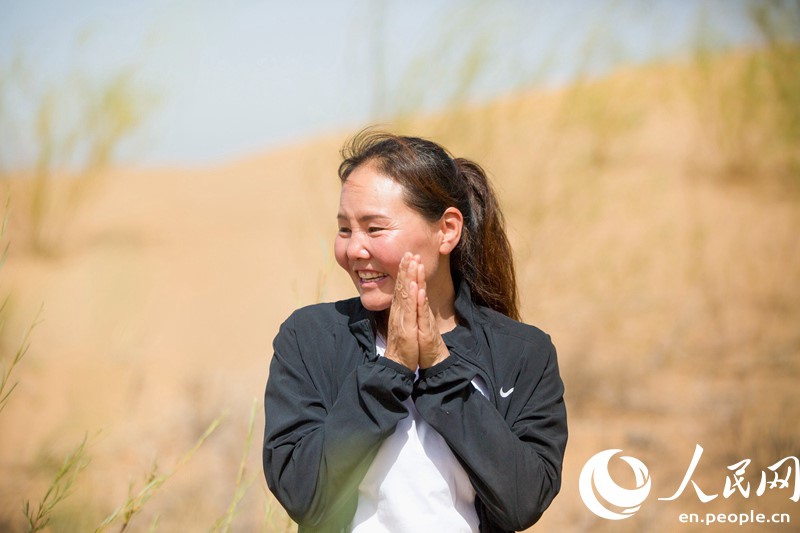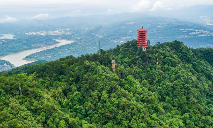Rose in the desert: breathing clean air a human right

Photo shows a patch of desert in northwest China. Deserts used to be the biggest nightmare for Otgonhuar in her everyday life. (People’s Dailhy Online/Tanja Herko)
The light of the May moon shines brightly on Otgonhuar's small tent. The desert extends its reach behind her humble home to the influx of tree planters, whose shadows move towards silvery dunes, each carrying a sack filled with saplings. Otgonhuar and her 24 workers have been planting trees in the Kubuqi Desert in northwest China’s Inner Mongolia Autonomous Region, which is the country’s seventh-largest desert, from dawn to dusk for the past two months.
Otgonhuar, 46, is the sole female leader of 288 local sand control teams. She and her team have planted trees on over 2,000 acres of desert in the last decade. Locals have dubbed her the "desert rose" as she encourages women to join her cause in making the desert greener.
"There is nothing more satisfying than watching your hometown transform from a desert to a green land." My ultimate goal is to establish an oasis in between the dunes, and the improved environment has made me more happier than ever," said Otgonhuar.
The desert and the oasis

Photo shows Otgonhuar walking through the desert where her dream has become a reality over the past three decades, as government-led afforestation efforts, with active participation from enterprises and residents, have successfully stopped the spread of desertification and poverty. (People’s Daily Online/Tanja Herko)
Not unnaturally for a village besieged by deserts, sandstorms used to engulf Otgonhuar’s hometown of Duguitala, a small village nestled in the Kubuqi Desert. Desertification led to air pollution and drought, making cultivation and grazing unfeasible. In the dusty settlement, sand dunes were the only entertainment for the local children, who would slide down the dunes in the early mornings to get their day started.
"When I was a kid, moving dunes would block our doorway overnight, and we had to fight our way out from the windows. Our houses were constantly buried under sand, so we had to move quite often," said Otgonhuar.
Unable to bear the thought that their beloved daughter may be stuck in the desert forever, Otgonhuar's parents saved their money and sent her to a school outside of the desert, hoping she could escape the fate that had been torturing her family for generations.
"The children at my school didn't want to play with me, all of them calling me a ‘dirty chick from the desert.’ They teased me, saying that people living in the desert never wash their necks, and for this reason, I got into a nasty fight with a boy," said Otgonhuar.
Throughout her childhood, Otgonhuar had only one purpose – that is, to stay as far away from the desert and her hometown as possible. Her dream became a reality when she found a job as an accountant in a nearby city, but her heart was never at peace.
The situation started to change in the 1990s when the local authorities decided to build a 100-km highway across the desert, encircling it with trees and grass, and then tackling the sand patch by patch.
Government encouragement to plant trees revealed a glittering prospect for Otgonhuar, who was then working at a local bank. She then decided to quit her job and in 1997 joined a construction team to plant trees along a highway in the Kubuqi Desert.
"My family was appalled by the decision. My siblings called me dumb, my mother cried and lashed me with her shoes. But my mind was settled. Running away from my hometown was never the answer; I needed to change it for the better," said Otgonhuar.
Planting trees in the desert was a difficult mission. For a woman living in a rural area, it was even worse. Many people ridiculed Otgonhuar for her "hallucinations," while some also confronted her, asking her to behave like "an ordinary woman" and serve her family while finding a decent job.
“Initially, my plan was to make money. But as time went by, I realized that planting trees is not merely a business, but also a great cause. Only by finally getting rid of the desert could we become rich and happy,” she said.
In 2007, Otgonhuar received an offer from a local company to plant trees in the Kubuqi Desert. She gathered 24 workers from poor families, and then set out on building her tree-planting business. To gather water for the saplings, she had to trudge deep into the desert and when planting the trees, she had to get up before dawn and climb dunes through sandstorms. Oftentimes, the trees she planted were buried beneath the sand overnight. Occasionally, the tent she lived in was destroyed by strong winds. But her efforts paid off, as her first batch of trees reached a survival rate of over 85 percent.
Holding onto this green dream, Otgonhuar and her team afforested over 2,000 hectares of sandy land inside the Kubuqi Desert in just a decade, with a sapling survival rate of over 95 percent.
The right to breathe clean air

Photo shows Otgonhuar during the 2022 Beijing Winter Paralympics, who was chosen as a torchbearer, where she used the event as a platform to push for her vision of a greener world. (Photo provided by Otgonhuar)
When watching the news on TV in 2012, a concept raised by Chinese President Xi Jinping caught Otgonhuar’s attention. "Lucid waters and lush mountains are invaluable assets. This slogan very much describes my notion of a good life," said Otgonhuar.
Being the first country in the world to issue a law on the prevention and control of desertification, China has achieved a historic transformation, with its shift from a state of rising desertification to a growing green expanse of land. From 2016 to 2020, China completed desertification control work on almost 11 million hectares of land. In 2021, the country planted 3.6 million hectares of trees, improved the ecology of more than 3 million hectares of grassland, and controlled 1.44 million hectares of sandy and rocky desertification land.
"As a rural woman, I had never given much thought to the concept of human rights. I only know that you need clean air and fresh water to survive in a wasteland, and the only way to get what you need is to plant trees in the desert," said Otgonhuar.
The Chinese public and the authorities have shared Otgonhuar's idea of human rights. She was selected as a torchbearer for the 2022 Beijing Winter Paralympics, where she met countless experts and volunteers advocating for environmental protection. Society ultimately embraced Otgonhuar's success after remaining steadfast in her quest to make her hometown greener. After refusing to support her, her husband became her assistant and those who formerly ridiculed her, especially other women, began to join her team. In the desert, she and her team are frequently recruited by local businesses to plant trees. Under her leadership, 24 workers have gotten out of poverty, and she makes a decent amount, up to RMB 200,000 a year.
“My hometown has already fulfilled the right to breathe clean air and live among the greenery. In the future, I want to encourage more people to join our cause of environmental protection and bring such rights to people around the world,” said Otgonhuar.
Photos
Related Stories
- Human rights hypocrisy
- China determined to jointly advance international human rights cause for greater benefit of people across the world with other parties
- Infographics: President Xi meets UN human rights chief Bachelet
- U.S. cruel treatment of illegal migrants reveals hypocrisy of so-called “human rights guardian”
- Subconscious racism causes "crisis ignored" regarding missing indigenous women: USA Today
- Widening wealth gap mirrors poor human rights situation in U.S.
- China stays committed to path of human rights development
- Gunshots shatter illusion of American-style human rights
- Indigenous leader calls for UN probe into Canada's role in human rights abuses at residential schools
- Iran condemns U.S. "hypocritical, deviant" human rights reports
Copyright © 2022 People's Daily Online. All Rights Reserved.









